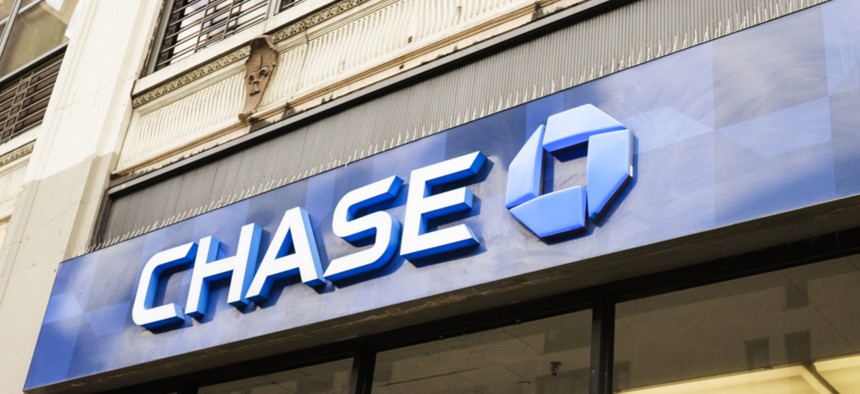
Chase paid customers back $50 million after a CFPB action. DW labs Incorporated / Shutterstock.com
These Are the Lending Scams CFPB Has Stopped Recently
From "zombie loans" to charging minorities more—companies refunded $12 billion in unfair fees and charges since the CFPB was formed.
The US federal agency created in 2010 to protect consumers from predatory lenders, unscrupulous debt collectors, and deceptive banks is in the midst of a heated political battle that could ultimately cripple it.
Appointed by Donald Trump, Mick Mulvaney took over as Consumer Financial Protection Bureau (CFPB) acting head on Monday, promising a “dramatically different” direction. Mulvaney, a long-time critic of the 1,600 employee agency, has already temporarily frozen all hiring and regulatory action.
CFPB’s detractors say the deeply partisan agency didn’t hire Republicans (or anyone with industry experience) when it was formed, and its lack of Congressional oversight means it isn’t accountable enough to US lawmakers.
Since its inception, however, the CFPB has filed dozens of judgements resulting in 29 million US consumers getting back $11.9 billion in unfair fees and other restitution, from big companies like American Expressand small local law firms alike.
The agency’s own list of enforcement actions provides a guide to the most popular ways lenders and collection agencies have been creatively cheating US customers over the past seven years. Here’s a look at some recurring scams:
Fake debt collection
The CFPB receives more complaints about illegal debt collection than anything else, and it is a growing problem in America. Unscrupulous companies buy information from banks about loans that are too old to collect, or not even owed, and then hound consumers into paying them back with illegal lawsuits and other threats, often with exorbitant fees attached.
The CFPB has investigated and fined 33 different companies for unscrupulous debt collection practices.
In September, the CFPB forced the National Collegiate Student Loan Trusts to pay $19.1 million back to consumers for “private student loan debt that the companies couldn’t prove was owed or was too old to sue over.” In October of 2016, it sued to shut down Northern Resolution Group, a Buffalo group accused of harassing, threatening, and deceiving “millions” of consumers across the country into paying debts they didn’t owe. And in July of 2015, JP Morgan Chase was required to refund $50 million to consumers for selling “zombie debt” to collectors that was “inaccurate, settled, discharged in bankruptcy, not owed, or otherwise not collectible.”
<>Tricking student borrowers into paying more<>
The CFPB has investigated and fined 14 lenders for over-charging student borrowers, lying to them about loan rates, and misrepresenting themselves as having a relationship with the federal government. Citibank, for example, was ordered in September to return $3.75 million to student borrowers that it had charged in late fees and interest while they were still in school. (Student loan borrowers can defer payments until they graduate).
In August of 2016, the agency required for-profit education company Bridgepoint to refund $23.5 million to students that it had “deceived” into taking out loans that were more expensive than advertised. And in July of 2015, it forced Discover Bank to refund $16 million to student borrowers for inflating their minimum payments.
Charging minorities more for car loans
Auto lending in the US has skyrocketed in recent years, including to borrowers without good credit history. Economists and bank analysts see some parallels between the subprime mortgage crash that caused the 2008 recession and the frothy auto loan market. Just as with mortgages then, there are plenty of unscrupulous practices happening in auto lending now.
The CFPB has filed 13 judgements against lenders and debt collectors related to auto loans.
In February of 2016, Toyota Motor Credit was forced to pay $21.9 million back to “thousands of African-American and Asian and Pacific Islander borrowers who paid higher interest rates than white borrowers for their auto loans, without regard to their creditworthiness.” In Sept. of 2015, Fifth Third Bank was required to pay $18 million to African-American and Hispanic auto loan customers who were charged, on average, $200 more per car loan than white borrowers with similar credit history.
Starting fake accounts
In September 2016, the CFPB fined Wells Fargo $100 million after it opened an estimated two million unauthorized credit card and deposit accounts, and then billed customers fees through existing accounts. This is the largest fine ever paid to the CFPB.
Beyond the CFPB, in some ways it has become easier for banks to rip off US customers since the subprime crisis. A growing number of big banksinclude language in the fine print of checking account applications that requires customers to rely on private arbitration to settle disputes, for example. In October, the US Senate killed a rule that would made it easier for bank customers to file class action suits.
Profits at big banks, meanwhile, have risen to near-record levels.
Mulvaney, a former member of House of Representatives from South Carolina, received nearly $200,000 in campaign contributions from the securities and commercial banking industries in the 2015-2016 election season.






